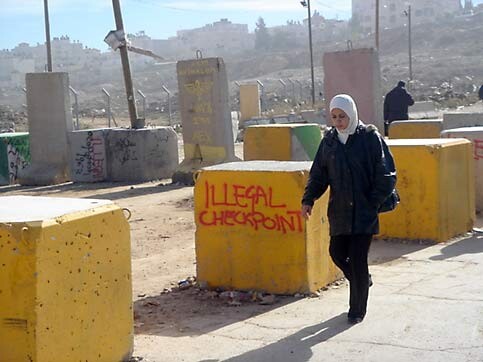
A statue of a lion graces the Al-Manara intersection in Ramallah, a billboard honors Arafat, who passed away on November 11th. (Charles Stratford)
“My son was shot by them on a day like today,” says Georgette, “the bullet passed straight through his chest but he’s alright now, thank God.” She leans frailly on the fence that separates our gardens in Ramallah. “Best you not go out just yet, if you need anything just ask.”
The Israeli Defence Force are in town again. They’ve been here all night arresting men suspected of involvement with armed resistance groups. They bang on doors and pull young Palestinians into the back of waiting jeeps. They come and go as they please.
On the street an elderly man is thrust up against the wall by a soldier less than half his age. The man looks terrified. The harness he wears is used to carry a container of tamarind juice which he sells to thirsty shoppers in the market. The soldier doesn’t know this. He continues to shout at the man in a standard learnt Arabic. “What’s your name? Where are you going? Where do you live?”
“We never know what time they will come,” says Georgette, “It might seem quiet half the time but anything can happen. Even if this was news, they’re too fast for the T.V cameras to catch.”
“Even if this was news,” that says a lot about life in Ramallah. The worlds press may have set up shop for a few days to witness President Arafat’s spectacular funeral. They may now be flooding in behind visiting foreign statesmen for optimistic quotes about the future - words of hope now the man around whose grave some lay wreaths has gone. But when the suits and Mercedes disappear the press aren’t far behind.
It’s difficult for the media to fully capture the systematic mass humiliation of innocent Palestinians by the Israeli army.
Ramallah may not be experiencing the daily atrocities committed by the IDF in Gaza, Jenin or Nablus but lives here remain deeply affected by the occupation. They are still collectively punished for deeds they didn’t commit.
“It’s the uncertainty of not knowing what will happen next, the powerlessness, the feeling of isolation from the outside world and not being able to go anywhere. This creates terrible depression in us,” says Georgette.
On 10th May her son, Shady, 30 was working at a jewellers in central Ramallah. When he heard the first tear gas bombs explode he told his boss, who suffers a heart condition, that he’d close the shop doors. They will be gone in five minutes, he thought, after they’ve taken whoever they want.
As the Israeli army opened fire outside he felt something appear from just above his left nipple. He fell to his knees before noticing the blood. Looking up, he saw his boss beating his head with his fists and screaming. “He thought it was his fault that I’d been shot, he was punishing himself.”
The soldiers kept firing as the three youths tried to carry him to safety. One was shot in the leg and Shady fell to the ground. He rolled across the road to an ambulance.
His face is tired and withdrawn as we sit talking about his experience. “Do I look older than my thirty years” he asks, rolling up his jumper to show the scars stretching from breast bone to waist. Five hours of emergency surgery showed the bullet had missed his heart by 4mm. A fragment of the door through which the bullet passed lodged into his liver. “I don’t hate the Jews or even the soldiers that did this they’re just following orders,” he says.
“We used to go to Jerusalem to visit the holy places and see our friends and family, says Georgette, before the checkpoints. “In the evenings we’d drive to Nablus and visit our cousins. We haven’t seen them for four years and don’t know when we’ll see them again.”
There is little opportunity for the family to escape their trauma. Hundreds of checkpoints make free movement around the West Bank almost impossible. Check points that guard the roads near which 120 illegal Israeli settlements continue to grow. Roads on which the 240,000 illegal settlers can freely travel.

A Palestinian woman approaches the Ramallah-Kalandia checkpoint. (Charles Stratford)
Georgette believes everyone shares her feelings of isolation and fear in Ramallah, the ‘quiet capital’ of Occupied Palestine. Shady has returned to work against the advice of his doctors. His wife is expecting a baby. “What can I do, we have to try and live,” he says. “But it’s hard when you can’t predict what will happen next.”
Charles Stratford is a British Arabic speaking journalist based in Ramallah.



